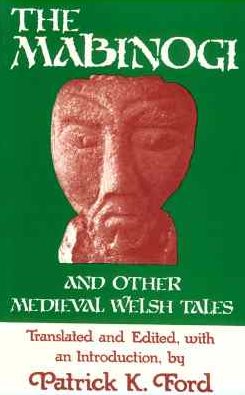
Recently Rated:
Stats
Blogs: 12
The Mabinogi by Patrick K. Ford
| Patrick Ford has given us a college level version of the Mabinogion with a great many notes explaining the background and hard parts of the translation. A very worthwhile version to have in your library. First, "The Four Branches of the Mabinogi," from which the collective title was derived, consisting of "Pwyll, Prince of Dyved," Branwen Daughter of Llyr," "Manawydan Son of Llyr," and "Math Son of Mathonwy." These begin with a story about the conception and birth of Pwyll's son, Pryderi, whose death is one of the early events in the "Fourth Branch," and concern a variety of heroes, and what are clearly rationalized gods. (Evangeline Walton turned each of the "Four Branches" into a novel; and other writers have done versions of one or another of them.) Second, there are two "native tales," "The Dream of Maxen Wledig" and "The Story of Lludd and Lleuelys," about Roman ("historical") and pre-Roman ("mythical") Britain as imagined by the medieval Welsh. The 'Lludd" text, as we have it, actually belongs to the "Chronicle" tradition launched by Geoffrey of Monmouth's supposed translation from an "ancient British book." (Which, if any part of it ever had any existence, was NOT the "Mabinogion.") The name of Lludd seems to be Welsh variant of a Celtic divine name, "Nuada" in Irish, "Nodens" in old British inscriptions, and "Nudd" in other Welsh sources; the variation seems to be due to assimilation to his epithet, Llaw Eraint, "Silver Hand," which is explained in the Irish tale of how the physician of the Gods made new hand for Nuada Argatlam." (H.P. Lovecraft picked up "Nodens" for the Cthulhu Mythos, a use which is unrelated; but Tolkien, whose hero Beren also lost a hand, actually wrote an early article on the Nodens inscriptions, and the apparent offerings of metal hands.) He may be behind King Lud, the supposed eponym of London. As Ford points out, Lleuellys, usually given as Llevellys, and also modernized as Llefellys, clearly should be read as Lleu-ellys, and recognized as a version of the god Lugh: the name Lleu is also used for a character in the Fourth Branch of the Mabinogi. "Maxen," in which a Roman Emperor seeks as his wife a princess seen in a dream, seems to reflect an even more garbled version of a story known to Geoffrey, compounding several real people, including Helen, the mother of the Emperor Constantine. She was, in a medieval confusion compounding an honest mistake with local patriotism, believed to be British, and identified with "Elen of the Hosts." Ford drops this, as it seems to contain a rather high proportion of medieval hagiography and romance, and a very low proportion of archaic Welsh tradition. Third are two Arthurian stories in native Welsh mode. "Culhwch and Olwen," is an elaborate quest, dragging in, at least by name, most of the gods and heroes traceable in Welsh material, and some of their Irish cousins into the bargain, mostly as part of Arthur's court. "The Dream of Rhonabwy" is a visionary encounter with Arthur and his warriors (and anything else I could say would probably be controversial); a fascinating text, which, after a very grittily realistic opening, almost boasts of its authentically dreamlike obscurity. It breaks off in a manner most modern readers will find unsatisfactory -- and its arbitrary nature may have been part of the point. Ford does not include it; a pity, but it is probably the least readable part of the collection. Fourthly however Ford does not translate the three "Romances," "Owain" (otherwise known as "The Lady of the Fountain"), "Peredur son of Evrawc," and "Gereint the Son of Erbin," the first and last of which are clearly versions of Chretien de Troyes' Old French Arthurian Romances, "Yvain" and "Erec," while the second is related in a more complex manner to his unfinished and problematic "Perceval le Gallois." These seem to illustrate Celtic materials going out into wider European society, and then flowing back into Wales to enrich (and confuse) the native heroic and mythic tradition with ideas of chivalry. The version of "Taliesin," based, as noted earlier, on the text Ford had re-edited from manuscripts, is restored to its two-story version, as "The Tale of Gwion Bach" and "The Tale of Taliesin," and includes reliable versions of the poems attributed to the variously-reborn hero. Again, there was a real Taliesin, a dark-age Bard, according to Welsh tradition; but these poems, like the stories, are pretty much independent of anything he may have actually composed. But they *may* reflect some very archaic ideas about the magical nature of poetry, which were old when the real Taliesin was alive. Ford included as an appendix a translation of the notoriously difficult "Cad Goddeu," or "Battle of the Trees." Ford doesn't claim to understand its "real meaning," if any, only what it actually says, and it is very nice to have it. Paperback: 205 pages Rating: 4 Stars Review by Bill Tillman
|


An excellent review of Ford's translation which is a personal favourite of mine.
As for why, firstly his translation is balanced. It is accurate but not awkward. It flows and leaps for the modern reader yet respects the ancestral source.
Second I like Ford's selection of what to include and exclude. Which is to say it matches my core interest which is the older Welsh archaic matter more than the Breton Romances.
Third Ford's Introduction is an excellent survey of Mabinogi studies up to the late 70s when he wrote it. For more recent observations look at Will Parker's website or mine.
Parker www.mabinogi.net
Morgain www.mabinogistudy.com